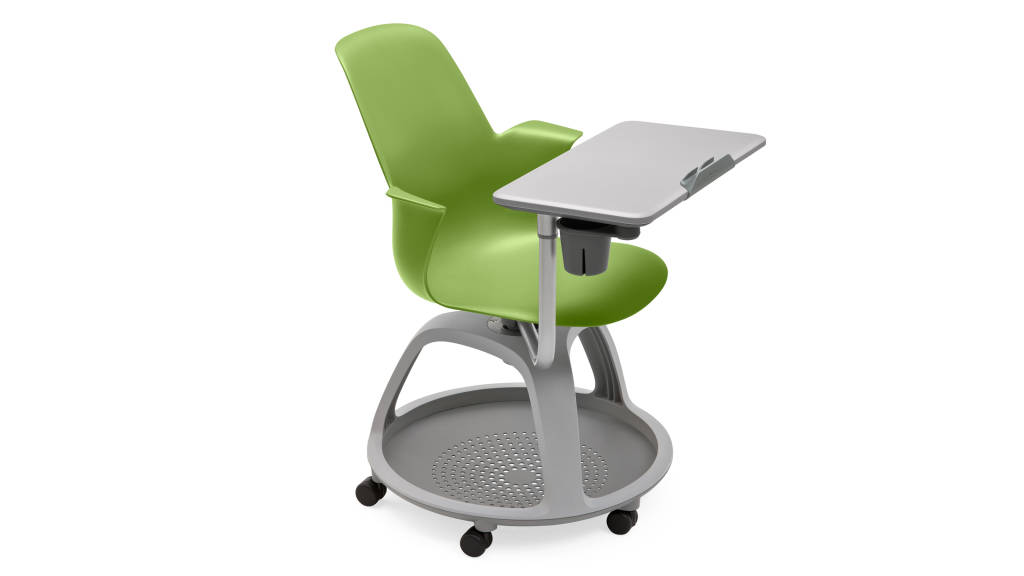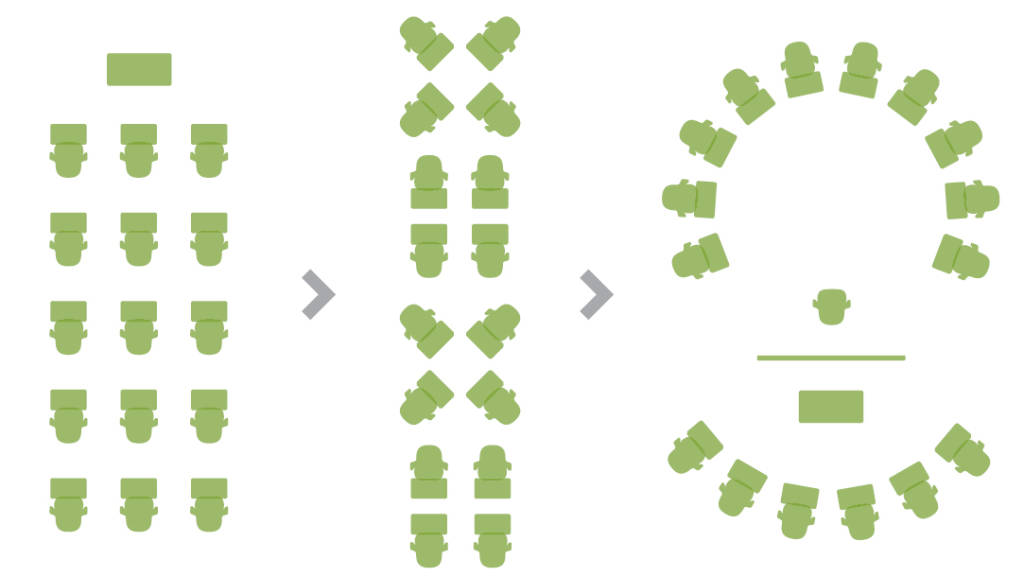Universidad Mariano Galvez: Active Learning
Educators and administrators at UMG understood they needed to make changes to their classrooms and develop a new classroom paradigm where technology and the physical space are integrated to support pedagogy and create a more active and engaging experience for instructors and students.
Universidad Mariano Galvez de Guatemala (UMG) is a private university in Guatemala. The university is considered to be one of the most prominent higher educational institutions in Central America. Like all higher education institutions, the school has been trying to address the many changes impacting education today: increased student expectations, rapidly changing technology and the adoption of more active and interactive teaching styles designed to engage students, leverage technology and explore more varied educational approaches. And just like other educational institutions around the world these changes have had a huge impact on the spaces where learning happens. Nowhere is this more evident than the traditional classroom.
Educators and administrators at UMG understood they needed to make changes to their classrooms and develop a new classroom paradigm where technology and the physical space are integrated to support pedagogy and create a more active and engaging experience for instructors and students.
“When we first started to look at making changes to our classrooms, we concentrated on technology. The integration of technology in education is changing teaching methods, and this requires transforming the spaces where this process is carried out. What was considered a classroom, must now be transformed into what we’re calling smart learning spaces,” says Alvaro Torres, chief information officer at UMG.
Solution
To help them learn more about how to create these smart learning spaces, Torres and Pablo Barrios, the university’s IT computing director, attended EDUCAUSE, an annual conference whose mission is to advance higher education by promoting the intelligent use of information technology. To their surprise, what caught their attention at EDUCAUSE was not a new technology product at all, but a classroom chair that would change everything about how they created classroom spaces.
“When we first saw Node at EDUCAUSE in the Steelcase booth, we became very curious about this chair and wanted to learn more about it. It was so different from what we had in our classrooms,” says Torres. “We understood how technology could improve the teaching and learning experience but we didn’t really understand how the furniture could have a similar impact.”
The underlying need is for flexibility. Different courses often use the same classrooms, yet their needs vary: science classes are different from history discussions or business seminars. Teachers and pedagogies vary, so classes might employ lecture mode, group set-ups, individual work—from one class to the next, or even during the same class period.
After spending about 30 minutes in the Steelcase booth, Torres and Barrios knew this was the solution they had been searching for to enhance the learning experience. They started searching for technology solutions, but realized how incorporating chairs that support active learning completed the package. Steelcase Node classroom chairs feature adjustable worksurfaces and flexible seats that swivel, a built-in storage shelf, and six casters for easy movement. With Node one classroom can create multiple settings—allowing students and teachers to shift quickly from lecture mode to a U-shape set-up for discussion to working in small groups. Flexibility in furniture, technology, and space simplifies transitions between different modes, classes, and teaching styles.

UMG initially purchased 3000 chairs as it began its classroom re-invention program.
After learning how well Node supported their vision, an additional 6000 chairs were purchased, making Node the standard in nearly 300 classrooms on the main campus. Eventually they plan to introduce this new standard of classroom to all their campuses.

Once the project was completed UMG recognized faculty would have to be trained on how to use these new spaces. “Teachers were originally afraid of the new technology in the classrooms and the challenge was training and adoption,” explains Barrios. “A very important aspect of this project is the training of teachers, because without such training some members of the faculty may not use the resources in a proper way.”
To help faculty learn how to use these new teaching tools, UMG designed training courses for teachers in the use of information technology and communications for education, as well as innovative learning methodologies.
“We saw how flexible Node was and we wanted to use it in our classrooms. We recognized right away that it would make the sharing of information easier between instructors and students and students with other students and allow our classrooms to provide a better learning experience.”
Alvaro TorresChief Information Officer at UMG
“Faculty is now very comfortable teaching in these new environments,” says Torres. “The flexibility of the furniture enriches the experience in the classroom and enables the technology to do what it was meant to do. We can do a lot of things in the classrooms now that we couldn’t do before.”
Results
“Before we attended EDUCAUSE we thought we had a really good understanding of how to create the kind of classroom education needs today,” says Torres. “We had not considered how the furniture could make a difference for our faculty and students. Node has helped us change the learning experience and leverage the investment in technology we made. We need to teach kids differently and Node will help us do this.”
Steelcase and Educause
At Steelcase, we have a passion for understanding how learning best takes place. And how smarter, active learning spaces can help. Spaces that help students connect, get inspired and achieve deeper learning. Solutions that help educators and institutions achieve better results.
That’s why we like to partner with organizations like EDUCAUSE, a nonprofit association whose mission is to advance higher education through the use of information technology. We are proud to be a Gold Level Corporate Partner, and through Steelcase’s thought leadership, help those who lead, manage, and use information technology to shape strategic decisions at every level.
EDUCAUSE actively engages with colleges and universities, corporations, foundations, government, and other nonprofit organizations to further the mission of transforming higher education.
Steelcase will be helping EDUCAUSE create a Flexible Learning Space for programming heavily geared toward CIOs and senior IT leaders at the EDUCAUSE Annual Conference, as well as participate as an exhibitor.
For more information, visit EDUCAUSE.
Universidad Mariano Galvez de Guatemala
Dealer Innovacion
Steelcase Products
Node seating
2012


